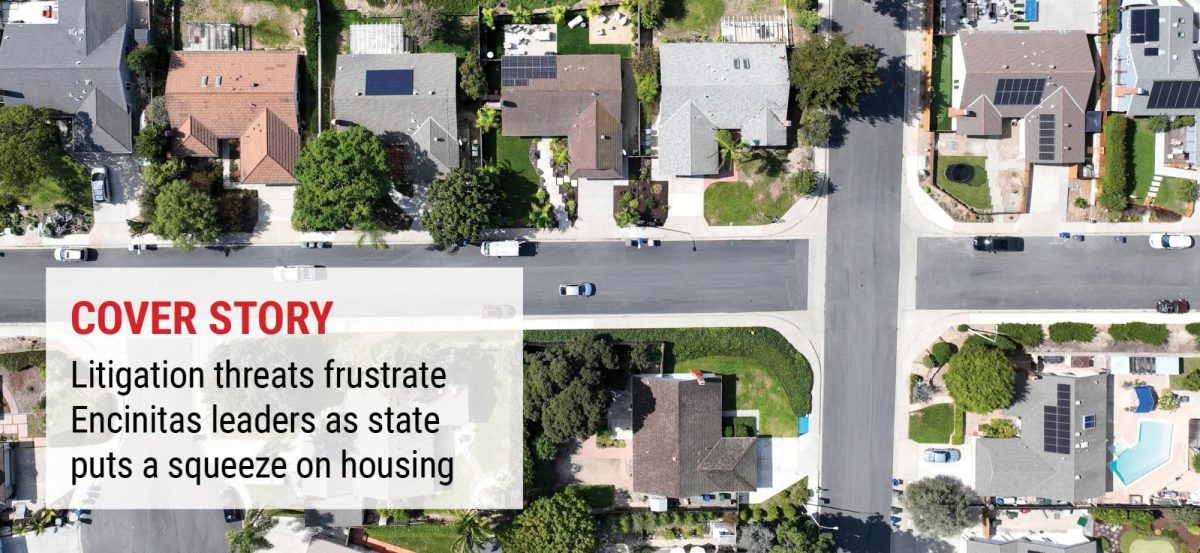Recent lawsuits from California’s attorney general indicate a new reality for housing development in San Diego County that could significantly reduce local control of land use.
Attorney General Rob Bonta threatened legal action against Encinitas in 2022 after the city failed to approve a housing project in Olivenhain. The city eventually complied, and grading on that project began this year.
“It took years to work through state housing law and how the city could comply with that,” Encinitas Mayor Tony Kranz said of the Olivenhain project. “Virtually nobody was happy with the outcome.”
Critics argued the development could increase traffic density to an unsafe level in the event of wildfire evacuation. Nonetheless, the attorney general pressured the city to approve the project or risk getting tied up in court.
“We spent millions of dollars on attorneys in litigation over our lack of a state-approved housing element,” Kranz said.
Ultimately, the city decided to approve the housing project to end the litigation.
The aggressive action by the state is not isolated to San Diego County. The California Department of Justice launched a Housing Strike Force in 2021 aimed at combating California’s housing crisis. And in May, the state successfully sued Huntington Beach for violating housing laws.
The DOJ did not respond to a request for comment.

“There’s no question there is a need for additional housing,” Kranz said. “(But) the only way that most jurisdictions will add the housing is under the threat of litigation. It’s unfortunate that it’s come to that, but it’s real.”
Housing advocates believe this type of legal action in Encinitas sets an important precedent for future housing development.
“I think it already is the new norm,” said Stephen Russell, president and CEO of the San Diego Housing Federation. “Encinitas used to be a code word for exclusionary housing policy amongst housing advocates. If you wanted to cite a ‘bad boy’ actor, it was Encinitas.”
Russell argues that any housing development, affordable or otherwise, is a benefit to the housing crisis.
“It’s like supply and demand in any product,” Russell said. “Higher supply reduces prices.”
Some lawmakers in Encinitas are concerned that increased housing density will not lower prices if units are not guaranteed to be affordable.

“You couldn’t build enough housing to take it from non-affordable all the way down to affordable, even if you ruin the area with all of this housing,” said Encinitas Councilman Bruce Ehlers. “What the current legislature has done is taken several hundred years of zoning law and thrown it out the window.”
Ehlers and Kranz are running for mayor this year.
Some housing advocates believe the argument over housing affordability is a distraction from the real issues regarding availability.
“When people say ‘I’m fine with them building more housing but only if it’s more affordable,’ I don’t think you’re really in favor of more housing then,” Russell said. “There’s a very broad public interest in having affordable housing (and) available housing in the community where people are working … (Encinitas) is not a self-supporting economy. You need workers.”
Only about 20% of the units in the Olivenhain project are guaranteed to be affordable. The rest of the units will be market rate.
Encinitas officials argue it’s difficult to ensure new housing meets affordability standards. That process is made more difficult when the state applies pressure to approve housing plans without approving subsidies that could lower the cost of housing.
“It’s a model that I think is broken,” Kranz said. “But it is so ingrained in the conversation out of Sacramento that it’s going to be very difficult to change.”
The recent lawsuits from the DOJ are causing many city leaders to ask a fundamental question: is it easier to spend millions fighting the state’s litigation in court, or is it easier to approve the state’s mandate?
“Fighting is a very expensive proposition,” Kranz said. “And the likelihood of prevailing is very low.”
Patrick Doyle is a local freelance writer.






